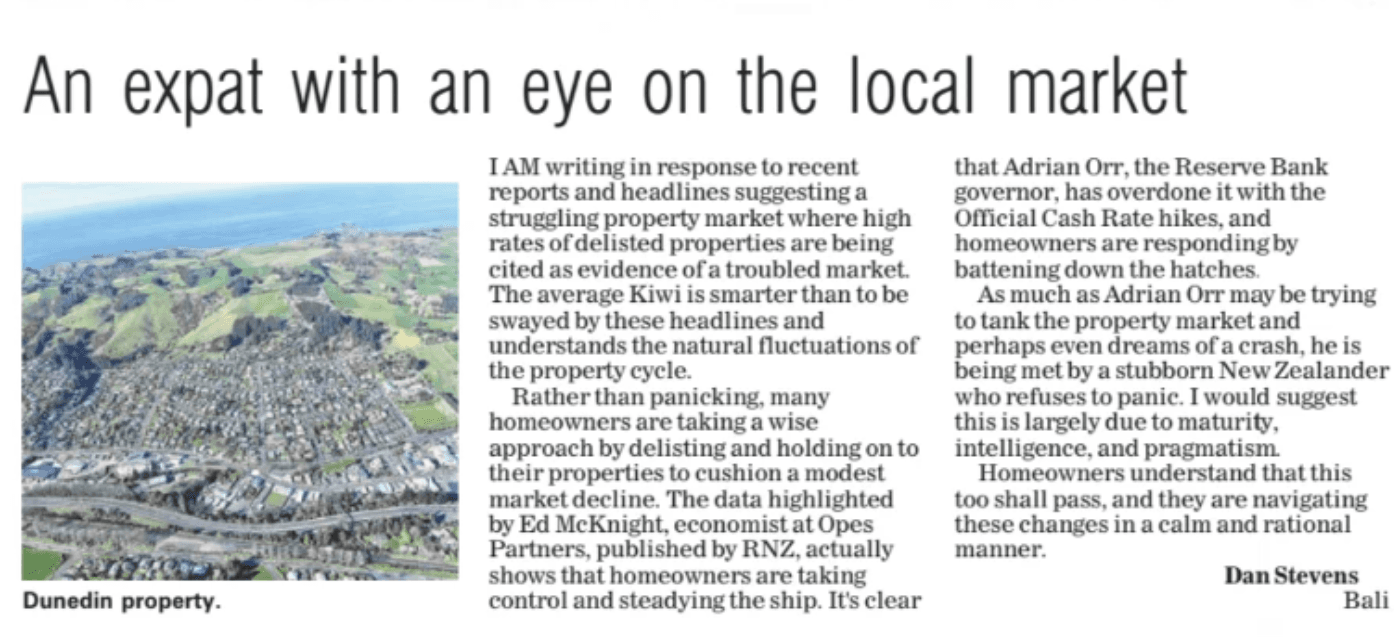
Property Investment
The EXACT date house prices will be their lowest
We all thought the market bottomed out in May 2023. But the numbers show houses may actually be more affordable today 👇
Property Market
2 min read

Author: Andrew Nicol
Managing Director, 20+ Years' Experience Investing In Property, Author & Host
Last week, Radio NZ called up Ed (our economist) to ask: “How many properties don't sell in NZ?”
So, Ed … (being Ed) … pulled the data, made a spreadsheet … and RNZ published it.
So did 1 News, The Herald and Seven Sharp 👇

The story struck a chord, so let's go through the numbers.
Sometimes, people list their property for sale. But they don’t get enough interest (or the right price). So, they take the property off the market.
This happens a lot. Over the last 6 months:
Very crudely, just under 1 in 3 properties are listed for sale, only to be taken down again.
So if you put your property on TradeMe, there’s a 2 in 3 chance you find a buyer at a price you agree to.
On the other hand, there is a 1 in 3 chance that you can’t get a buyer at a price you can accept.
These numbers were so high I had to call a couple of real estate agents to make sure the data wasn’t faulty.
Many agreed. Around a third of properties don’t sell. But it depends on what part of the country you’re in.
Northland and Auckland have the most de-lists.
Around 46% of Northland properties come to market and then don’t sell.
In Auckland, it’s 37%.
But in Wellington, it’s a different story. Only 10% of properties come to market and don’t sell.
Some people will look at that and say: “That proves the Wellington property market is strong.”
I’m not so sure.
To me, that’s a sign that Wellington property sellers are motivated.
After all, Wellington property prices are 23% below their peak levels.
There are a lot of redundancies happening in the public sector. Many of these job losses are in Wellington.
This forces some sellers to accept a price lower than they really want. These sellers don’t have the luxury of de-listing their properties. They can’t afford to wait until the market recovers.
That means only the most serious sellers bring their properties to market.
Here’s what the numbers look like across the country:
It’s a tough property market. Even still, the number of de-lists is normal.
Sure, the rate of de-listing is twice the rate from a couple of years ago. That’s expected.
Back then, prices were booming. So it was easier to sell and get a price you were happy with.
Now, the market has changed. But it’s not an unusually high level of de-listing.
I don’t take these numbers to prove that the market is particularly hot or not. As I said, de-listing your property is a luxury.
It means you’re not forced to sell. That is exactly the point this Kiwi made in his letter to the editor of the Otago Daily Times –

Yes, Ed’s data even prompted letters to the editor!
As this writer points out, the number of de-lists can aid the market recovery.
If sellers aren’t willing to agree to a lower price, then de-listing decreases supply.
That keeps the market healthier than it would have otherwise been.
Managing Director, 20+ Years' Experience Investing In Property, Author & Host
Andrew Nicol, Managing Director at Opes Partners, is a seasoned financial adviser and property investment expert with 20+ years of experience. With 40 investment properties, he hosts the Property Academy Podcast, co-authored 'Wealth Plan' with Ed Mcknight, and has helped 1,894 Kiwis achieve financial security through property investment.
This article is for your general information. It’s not financial advice. See here for details about our Financial Advice Provider Disclosure. So Opes isn’t telling you what to do with your own money.
We’ve made every effort to make sure the information is accurate. But we occasionally get the odd fact wrong. Make sure you do your own research or talk to a financial adviser before making any investment decisions.
You might like to use us or another financial adviser